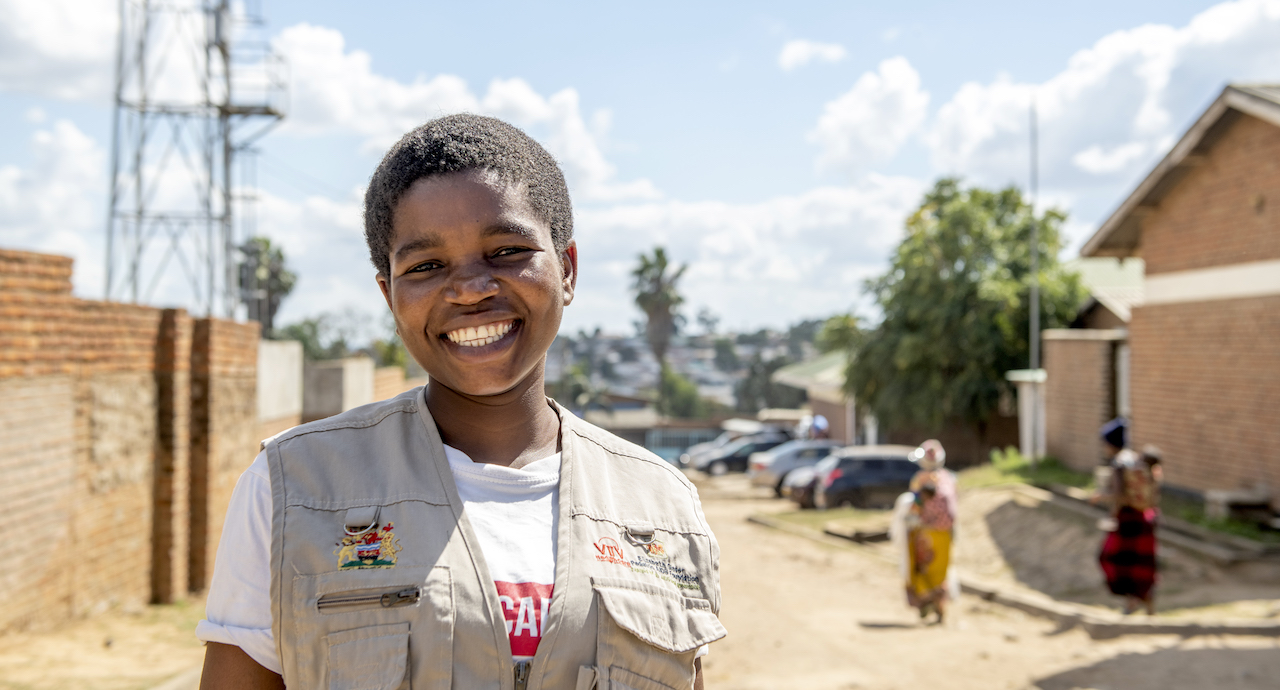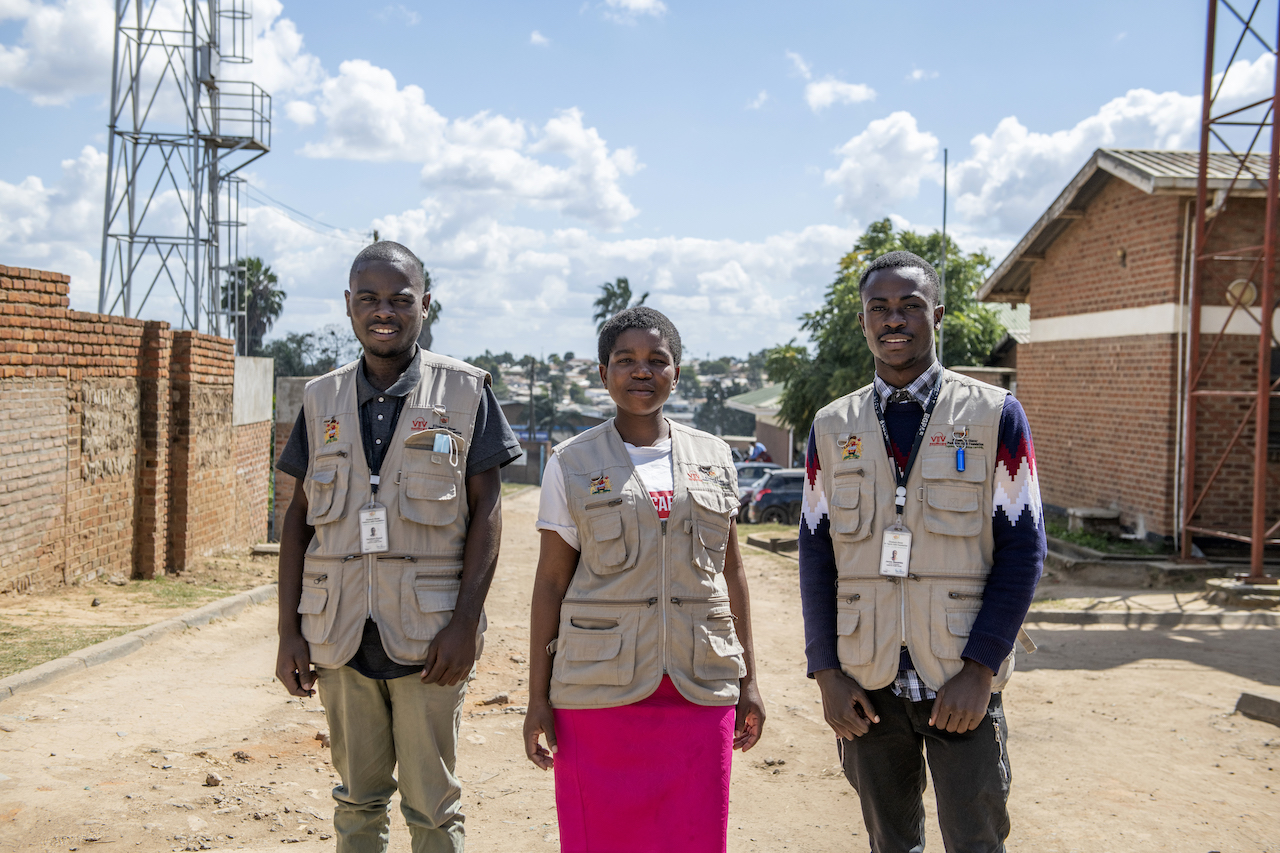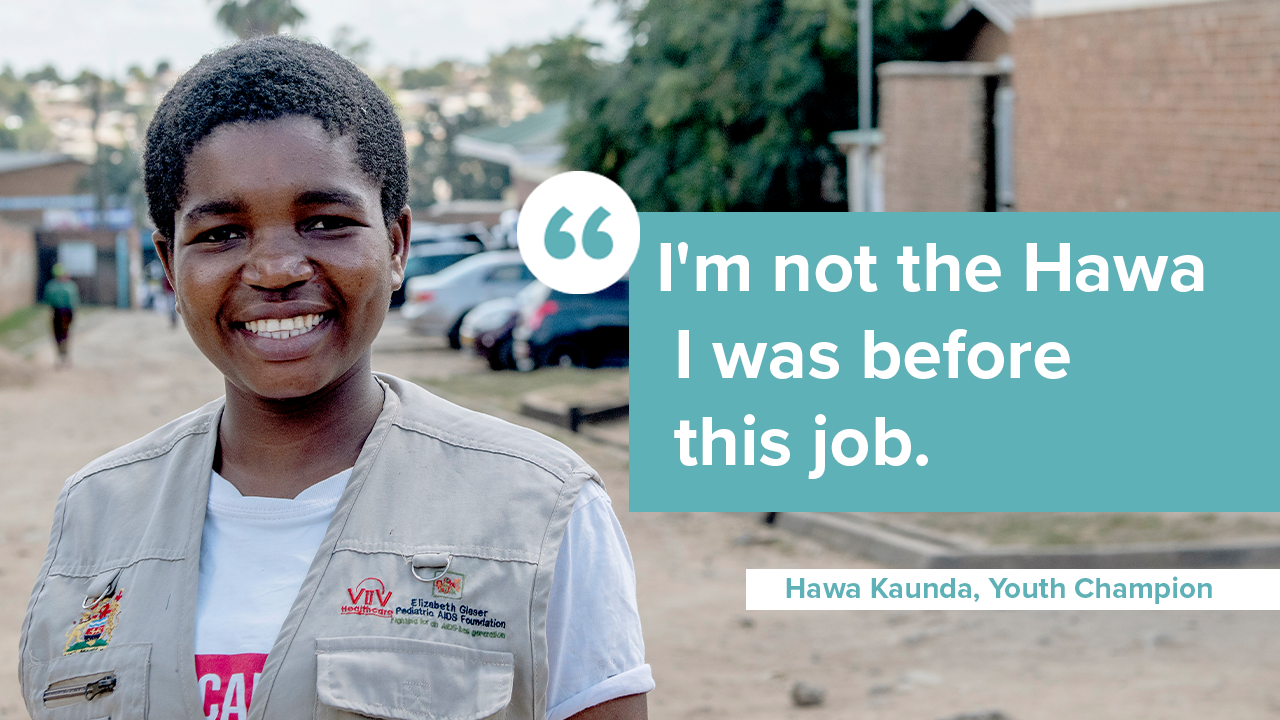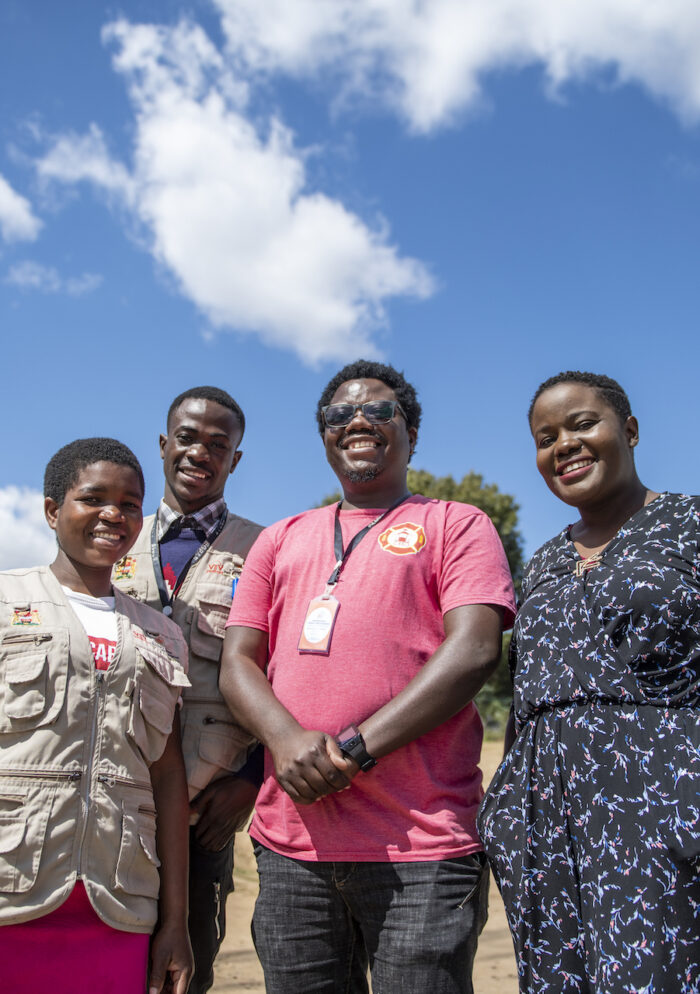Sometimes You Do Also Need Care from Someone
 Hawa Kaunda, youth champion at Ndirande Health Center in Blantyre, Malawi. Photo by Eric Bond/Elizabeth Glaser Pediatric AIDS Foundation 2022
Hawa Kaunda, youth champion at Ndirande Health Center in Blantyre, Malawi. Photo by Eric Bond/Elizabeth Glaser Pediatric AIDS Foundation 2022
“My journey has been up and down.”
— Hawa Kaunda, 24, a youth champion at the Ndriande Health Center in Blantyre, Malawi
These days, it is definitely up. But Hawa has had her tough moments.
Having lost her father and mother to advanced HIV disease, Hawa, at age 16, decided on her own to get tested for HIV. She sought support from her aunt, a health worker, but her aunt would not accompany her to get tested—fearing stigma if Hawa tested positive.
“She was worried that her colleagues would think differently about her,” says Hawa.
So Hawa gathered up her courage and walked alone. She learned that she is living with HIV. But she was not immediately initiated on antiretroviral medication [ART], which is the usual protocol.
“I was not eligible to start ART without [permission from] my guardian,” says Hawa, “so I went back to tell my aunt so that she come to the facility so that I can start ART. She refused.
“My older sister then was already [deceased]. So I told a friend who was older than me [about my HIV status]. She came to be like my guardian. But I was listening [to the counseling for] myself because I already knew that I have to be taking this [on my own]. If I don’t remind myself, no one will remind me.”
On that day, Hawa stopped walking alone.
“The ones who were counseling me introduced me to a Teen Club that I could come to during weekends—the same day I came to take medication,” says Hawa. “The Teen Club helps the adolescents understand what HIV means and how they can cope with living with HIV. There we are all the same. No one can be discriminated. We share stories, share experiences. So the Teen Club is good. It’s super. It gives me strength in myself.
“And most importantly, the youth who are in Teen Clubs, their viral load is suppressed— because when we interact, everyone is [also] coming to take drugs.”
From client to peer leader
 Yamikani Ziyaya, Hawa Kaunda, and James Masamba, youth champions at Ndirande Health Center in Blantyre, Malawi.
Yamikani Ziyaya, Hawa Kaunda, and James Masamba, youth champions at Ndirande Health Center in Blantyre, Malawi.
Photo by Eric Bond/Elizabeth Glaser Pediatric AIDS Foundation, 2022
At the Ndirande Health Center, Hawa was nurtured into leadership, eventually being offered a position as a youth champion through the Elizabeth Glaser Pediatric AIDS Foundation (EGPAF), working alongside health workers to connect young people to care and treatment and to empower them.
“I wasn’t really sure what the job was going to be like, but I was excited. We went for trainings on how we can do our job and that was my first time to be somewhere out [of town] … to be at a hotel. I was happy.
“I’m not the Hawa I was before this job,” she says. “I have learned a lot. I know how I can convince the youth to be on ART, not to default. I’m able to counsel the youth to know the importance of taking pre-exposure prophylaxis (PrEP) [which protects sexual partners who are not living with HIV], and I know how I can talk to my fellow youth about family planning methods.
“My main role is that I help my fellow youth to access health services in different entry points. We screen the youth. If they are found to be HIV-positive, we link them to ART. When they are linked, we follow them. We visit at home, call them to ask if they have any problem with the drug. We link them to a doctor or a technician to help [with any] problem they are facing.
“On gender-based violence, we link the youth to people that can help. Maybe the gender-based violence is sexual. We can link them to an HIV diagnostic assistant to test them. They can get PEP [post-exposure HIV prophylaxis]. And we link them to emergency contraception.
“If youth are looking for a family planning method, we explain the family planning methods that we have here now. We have Depo [an injection of progestin hormone] or [birth control] pills, female condoms or male condoms, we explain to them so that they can understand when they’re choosing.”
Red Carpet and DREAMS
As a youth champion, Hawa works through the teen club, as well as through the Red Carpet program, which provides adolescent-friendly services, and through the DREAMS initiative, which educates and empowers adolescent girls and young women.
“Red Carpet focuses on testing youth who are HIV-positive to know their status,” says Hawa. “We are targeting the 95, 95, 95. The first 95 is to identify youth who are positive, to know their status. We move on to the second 95, those who are HIV-positive—they should be linked to care and adhere to treatment. The third [95], those who are on treatment, [we make sure] they’re viral load suppressed.”
Since Hawa started working with Red Carpet in July 2020, Ndirande Health Center has tested 1,701 youth. Among them, 203 tested positive for HIV and were linked to treatment and support, including the Teen Club. Those who tested negative but were at high-risk for acquiring HIV were linked to PrEP.
DREAMS is a USAID-sponsored program for all adolescent girls and young women. The acronym stands for Determined, Resilient, Empowered, AIDS-free, Mentored, and Safe. DREAMS members meet regularly for solidarity and to learn about family planning methods and other issues that young women face.
“DREAMS also helps in activities that can make them to be financially stable,” says Hawa. “Some have gone to study bricklaying from these clubs. Or even welding.”
Their virus becomes emotional
 Hawa Kaunda, youth champion at Ndirande Health Center in Blantyre, Malawi. Photo by Eric Bond/Elizabeth Glaser Pediatric AIDS Foundation 2022
Hawa Kaunda, youth champion at Ndirande Health Center in Blantyre, Malawi. Photo by Eric Bond/Elizabeth Glaser Pediatric AIDS Foundation 2022
Hawa’s role as a peer counselor is vital to helping youth transition from childhood to adulthood. Along with the pharmaceutical necessities, young people living with HIV are navigating the usual realities of sexuality, identity, and changing relationships with parents and friends. Add to this the stigma around HIV that persists—even now, 40 years into the pandemic. Hawa and her fellow champions reach out to young people who access the HIV program at Ndriande Health Center to make sure that they are adhering to treatment. And to listen.
“We call them on phones to discuss,” says Hawa. “Do you have problem? They explain. Maybe they are being abused. Gender-based violence is not only sexual. Maybe it is physical … but this physical connects with the emotional. Maybe there are five or six children at home, but only one works doing house chores: mopping, cleaning, sweeping. You find that this person is being abused.
“We can see this as physical [abuse], but it’s [also] emotional—because if the person is HIV-positive [she] might be thinking ‘It’s because I am HIV-positive, so I’m useless to them. That’s why they make me do this.’
“So I help my fellow friends solve problems whether they are HIV-positive or not. I also explain my story. If we can handle [the issue], we handle. If we cannot, we hand over to a psychosocial counselor.”
A path into public health

So what’s next for Hawa? She is studying at university to get a degree in public health.
“I’m already supporting my fellow youth so that they can have good health services,” says Hawa, “If I stay in public health, that means I’ll have access to help my fellow friends, my country to have good health.
Now, as a vital colleague to the other health workers at Ndriande Health Center, Hawa is respected as a young woman of strength and courage. But as she looks back over the lows and highs of her life, Hawa acknowledges the love and support that she found when she needed it. Would she have adhered to her ART while living alone in an unsupportive home without the solidarity of her peers at the Teen Club? Would she have become a peer leader without the nurturing and encouragement of health workers? This reality motivates her in her work.
“Sometimes you do also need care from someone,” says Hawa.
Youth champions Hawa Kaunda and James Masamba with Prince Henderson, CCAO, EGPAF-Malawi, and Tessa Musukwa, senior technical officer, EGPAF-Malawi. Photo by Eric Bond/Elizabeth Glaser Pediatric AIDS Foundation, 2022
Eric Bond
Malawi
Adolescent Identification, Care & Treatment



